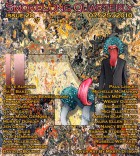Avalanche is a beautiful story, one that I have reread many times. How did this story come to you?
Thanks for the kind words! I’m so honored to have work appearing in SmokeLong Quarterly. This story sprouted from my novel (which is still in progress). Spending a great many hours inside a novel, I’ve found, can lead to sudden cravings to write flash fiction. The craving happened; I peeled off a passage that I thought might provide the raw stuff for flash and began to radically revise. (There’s something liberating about this, too—taking a polished piece of novel and going wild, tearing the passage open, writing FROM it and TO it, finding its new story.) The end result was “Avalanche,” an entirely independent work of fiction. (Only one paragraph remains similar.)
The story feels as though it were about a whole life, not just one moment in a life. The reader begins to identify with the boy through the way you show us glimpses of how he sees his family and the things that happen, and by what the boy notices. How are lovable, empathetic characters created by a writer in a short space?
For me, deeply felt characters (of any stripe—the lovable, the despicable, the despicably lovable) are created with distinct images and actions, the kind that powerfully suggest invisible (but, again, deeply felt) universes. You may not know exactly what’s suggested, but you feel it. Maybe such images and actions operate in the same way myth does—they build a bridge that links the universal to the individual. It’s a two-way bridge. And the bridge is so awesome that once you’re on it, you don’t know which side you came from first. You’re not even sure they’re separate places.
Which writers inspire you?
Generous writers. To me, there are two kinds. The first is the generous writer who produces pieces that feel like they’re made of everything the writer’s got, pieces you can’t help sinking into. Total immersion. You put the story down—where did the time go?
The second is the generous writer who is generous to the craft, who gives to readers and other writers by writing about writing. Mentors, directly or indirectly. These are the writers who create community. And community is so important to writers, who write alone.
Without generous writers, I couldn’t continue writing. And probably wouldn’t have started.
What is new in your writing world? What are you working on?
I’m pushing through to a new draft of my novel and I’m hoping that what I’m doing is making the book better, but I don’t think I’ll know until August. And I’m trying to put together two collections of short stories. One of them is about cowboys, mostly.
What are the best aspects of writing flash? What do you love about reading/writing flash specifically?
Flash is small. So it’s possible to pick the whole piece up (the beginning, middle, and end, if that’s what they are—sometimes these categories feel less useful, because flash can seem so tightly fused together) and hold it in your head. The whole piece, all at once, right there in your mind. I’m not saying that flash is simple, light, or without mystery; I’m only arguing that because of its smaller size, a reader (or writer) can more manageably contemplate its complete shape. And during drafting, this means that you can sometimes immediately see the impact one change has on the work as a whole. There’s a kind of puzzle-cracking pleasure in this, a pleasure that comes more slowly (and sometimes, more powerfully) with longer works.


